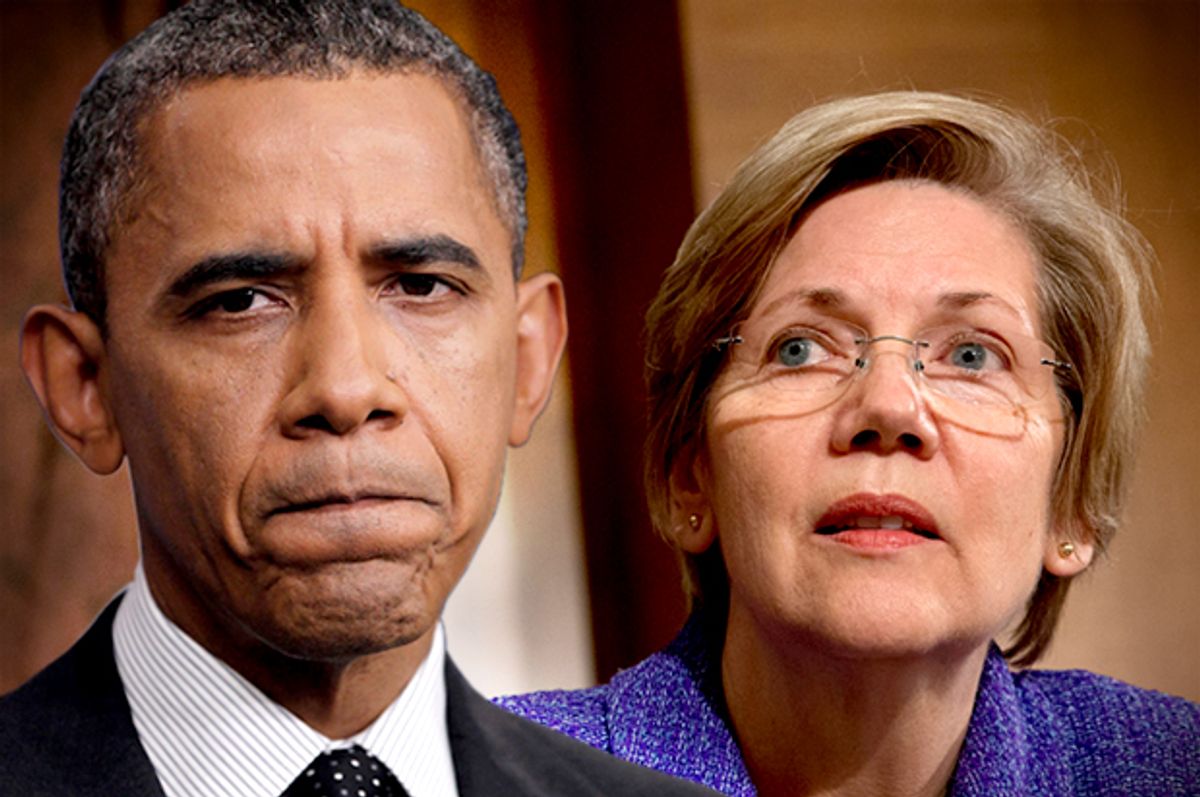The House passage of the omnibus spending act is on its face a defeat for the progressive wing of the Democratic Party that fought to block it. In the end, though, risking a government shutdown over the bill’s ugliest provisions – restoring government protection to risky bank maneuvers and raising the cap on party contributions, astronomically – was probably too much to expect. According to Greg Sargent, Dem sources say that while House Minority Leader Nancy Pelosi fought it ferociously, in the end she signaled that members could vote their conscience.
And what did that vote tell us about the Democratic Party? Most of the departing Blue Dogs who lost their seats voted for the bill, predictably. In a break with President Obama, who lobbied for it, most of the Congressional Black Caucus did not. The remaining House Democrats are going to be more reliably critical of Wall Street, and less inclined to bow to the White House. 2015 is going to be interesting.
I admit, for a few hours on Thursday I thought Democrats might be able to win the public relations battle if they blocked the bill. Why should taxpayers protect risk-taking banks? The story of how Citigroup wrote the provision, and Wall Street’s friends snuck it in, is so outrageous I thought it had a chance to carry the day. So Republicans wouldn’t pass a spending bill without this giveaway to Wall Street? That would make them responsible for a government shutdown. But Sen. Ted Cruz and his allies may have thought the same thing about their message when they shut down the government last year.
We’ll never know if Democrats could have mustered populist outrage over Washington catering to Wall Street in the event of a new shutdown. But what else did we learn from the battle?
We now know that Nancy Pelosi is through guaranteeing the votes for ugly messes liberals hate (like the debt ceiling and sequester deals) but that House Speaker John Boehner can’t pass alone. In a new Congress where many Blue Dogs lost their seats, this sets the stage for House Democrats to block elements of the GOP agenda, especially when there can be left-right alliances. Tea Party defenders say it was partly inspired by outrage at the 2008 Wall Street bailout and corporate-government cronyism; it would be nice if House adherents remembered those roots.
We also know that Elizabeth Warren wasn’t tamed by her ascent into Senate Democratic leadership; she was emboldened. While her star turn may increase the pressure on her to run for president, I’m with Elias Isquith here: I still hope she doesn’t. A President Warren would lack a Sen. Warren protecting her left flank. Giving Warren more progressive Senate allies would be more politically productive than elevating her to the White House.
We’re also seeing a more clearly defined bloc of Wall Street critics emerge in the Democratic Party, just in time for 2016. The Warren-led battle over Treasury nominee Antonio Weiss is also heating up – and both fights pit the popular progressive against President Obama.
Many news accounts have depicted the spending bill battle as Warren vs. Obama, setting up an ongoing clash between the two Democratic leaders. But I think the Warren vs. Obama story line can be overblown. It’s probably too much to expect the president to veto the spending bill and effectively shut down the government – clearly he doesn’t share my optimism that Democrats could win that P.R. battle. But if the noxious measures hidden in the bill came to him as individual pieces of legislation, he’d be under a new level of pressure from congressional Democrats to veto them, and I expect he would. Obama made clear that while he wanted Democrats to support the spending bill he shared their opposition to both provisions.
In fact, the next two years will be a test of who the president really is: the change agent who inspired progressives, or the guardian of Wall Street power that his left-wing detractors claim he is. Bloomberg’s Dave Weigel makes the case that Warren, rather than being an Obama opponent, could be the best protector of his legacy that the president has. We’ll see.



Shares